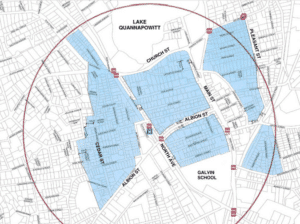Wakefield joined Marshfield and Milton in the suburban resistance to the MBTA Communities housing production law, rejecting three proposals to rezone an area near transit for multifamily development.
The town’s Planning Board recommended an area near the commuter rail station on North Avenue and the MBTA 137 bus route for the new district. The proposal would have allowed maximum 35-foot buildings heights and a maximum of four units per lot.
“We tried to keep [density] as low as possible,” Planning Board Vice Chair James Hogan told Monday night’s town meeting. “We didn’t think you guys would be supportive of the idea of us having higher density and smaller zoning districts which is theoretically a possibility. We thought the idea of coming in and saying you can build a 10-unit house as-of-right, people would kick me in the head.”
But opponents urged rejection, citing potential additional costs including public school tuition and overdevelopment.
“If you live over in those neighborhoods, you could knock down a little house or a couple of buildings and you could build a little house with four floors, parking on the first floor plus two floors above it with apartments with a rooftop deck,” resident Robert McLaughlin said. “They could build that all over the place in that area.”
Under state regulations, Wakefield is required to rezone areas allowing potential development of nearly 1,700 housing units on at least 36 acres. But because the district is largely built out with residential properties, the proposal would have created only 250 new housing units, a consultant study concluded, Hogan said.
The MBTA Communities law is designed to control Massachusetts’ spiraling home prices by encouraging housing production near MBTA transit stops. Wakefield’s median single-family home sale price is $712,500 year-to-date, according to data compiled by The Warren Group, publisher of Banker & Tradesman.
Marshfield town meeting last week rejected a rezoning plan for 84 acres to allow potential development of 400 housing units.
Communities that have MBTA commuter rail stations, or located next to cities and towns with stations, have until Dec. 31 to submit rezoning plans to the state Executive Office of Housing and Livable Communities for approval. The requirement applies to 130 cities and towns.
Aside from outright defiance, some communities wary of additional development are seeking to minimize new housing creation by rezoning areas already occupied by apartment and condominium complexes.
In March, the Chelmsford Planning Board recommended a section of Route 110 already built out with multifamily developments and the former University of Massachusetts-Lowell West campus where a 340-unit development is under construction.
Burlington’s Planning Board chose five new overlay districts, four of which already are occupied by apartment and condo complexes.
Communities that fail to comply with the rezoning will become ineligible for some state grants.
In a presentation prepared by the Wakefield Planning Board, the town received $3.7 million in the past three years from such programs, including a MassWorks infrastructure grant for a water main project on North Avenue.









